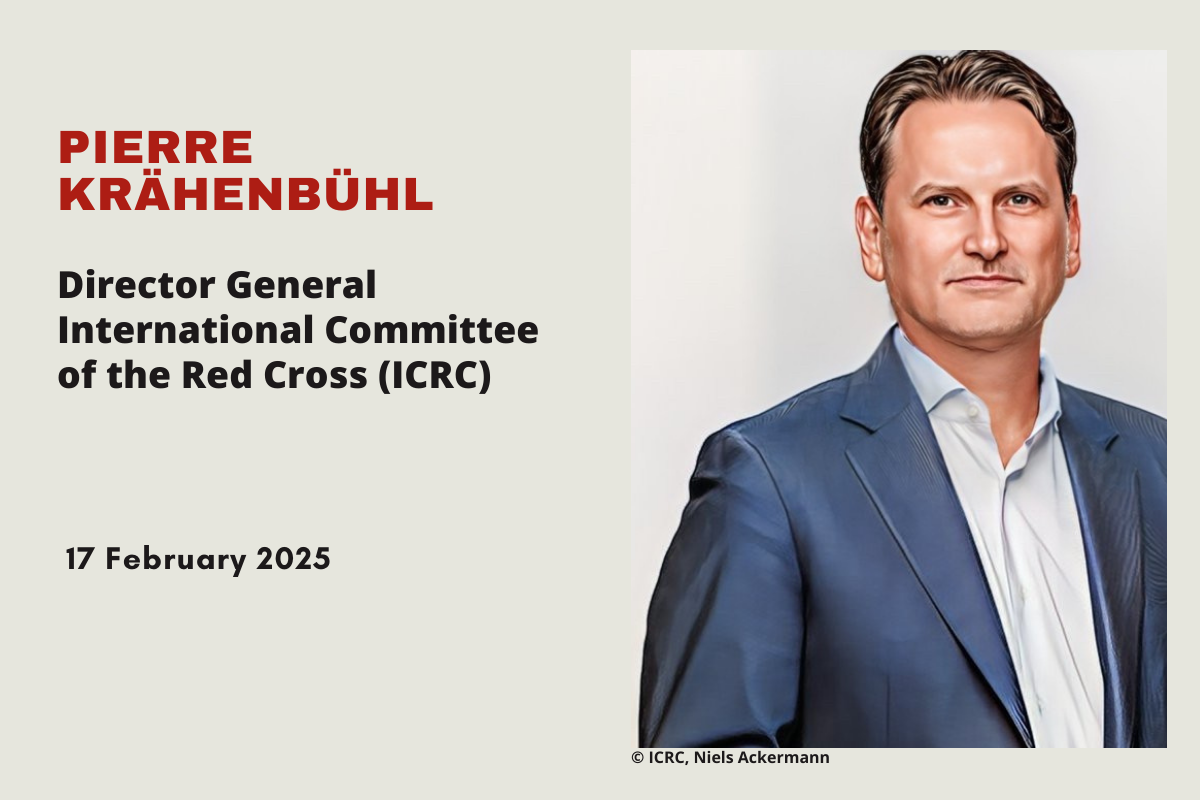The interview | Pierre Krähenbühl
 | What are you the most proud of regarding your organisation? |
When we see images of detainees or hostages being released or transferred in Yemen, Israel, or the Occupied Territories, most of us are aware that this is the outcome of highly complex and delicate negotiations carried out under the mandate of the International Committee of the Red Cross (ICRC), thanks to its unique role as a neutral intermediary. We also realize how significant this work is to these individuals and their families. It is in situations like these that I feel great pride in our organization, as our teams work closely with communities impacted by armed conflict and violence or meet with leaders of armed groups in remote areas to engage in difficult conversations about the need to respect international humanitarian law (IHL) and better protect civilian populations. All ICRC employees around the world undoubtedly share this feeling of pride because it is the result of a powerful collective effort in which we all play a part.
 | Could you walk us through the main challenges you are currently facing? |
First, and foremost, the massive scale of the humanitarian needs and our indignation at the horror of war. The needs are constantly increasing, as new conflicts emerge, and old ones grind on without a political solution forthcoming. This highlights another major challenge: the lack of political appetite and courage to prevent and resolve existing conflicts.
 | Among the concentration of actors based in Geneva (IOs, NGOs, permanent missions, academia, private sector or others), who do you work with and how? |
We work closely with all types of actors in different areas. Through the Permanent Missions, we initiate dialogue with States on various subject matters, such as their IHL obligations. We also share operational experiences from our offices in 90 countries with the diplomatic community.
We interact constantly with international organizations, non-governmental organizations, and academia on multiple topics, from ongoing debates in humanitarian law to the challenges faced by specific vulnerable populations to the consequences of the digitization of armed conflict for the people directly affected. These interactions in Geneva complement those of our teams on the ground.
Securing funding for an organization like the ICRC is also an important aspect of our work. We rely on the contributions of States, private donors, and foundations, especially in Geneva. Without them, we would not be able to carry out our mission to protect and assist communities impacted by armed conflict and violence.
 | In your opinion, what are the strengths and weaknesses of Geneva? |
Geneva is an exceptionally diverse city. That makes it an especially enriching place to be for the ICRC, as well as for people who live here and visitors who are just passing through. Organizations like ours benefit from being near many others working in the humanitarian sector, which makes it easier to network with each other, identify synergies, and respond more effectively to emerging needs.
The multiplicity of voices and perspectives that intersect in Geneva is one of the city's great strengths. To take full advantage of this strength, organizations based here must listen to these diverse perspectives and take them on board, while also remaining closely connected to what is happening in the field and the world at large. Maintaining these essential connections enables them to adapt and respond effectively to ever-changing needs.
 | What blew your mind or inspired you lately? |
Recently, I have been deeply inspired by our humanitarian work in Goma, as well as in Ukraine, Myanmar, Somalia, and many other places. These situations illustrate the value that the ICRC brings in providing vital assistance at the worst times of people’s lives.
Another great source of inspiration for me was the 34th International Conference of the Red Cross and Red Crescent Movement last October. A hundred national Red Cross and Red Crescent societies and representatives of as many States met in Geneva with the International Federation of Red Cross and Red Crescent Societies and the ICRC. I was deeply moved by the powerful message that this conference sent to the world. The Red Cross and Red Crescent Movement is one of the few remaining bastions of multilateralism and respect for different opinions, where principles of impartiality, neutrality, and humanity are not only professed but practiced daily. The conference attendees adopted all resolutions by consensus. This also sent a strong message: let's stop focusing on what separates us and instead focus on finding points of convergence.
In the same spirit, last September, the ICRC, through our President, launched a global initiative on international humanitarian law (IHL) in partnership with six States: Brazil, China, France, Jordan, Kazakhstan, and South Africa. This initiative aims to (re)mobilize the international community around the urgent need to defend the principle of humanity, even in times of war. Since its launch, it has attracted growing interest and broad support from many countries around the world. This can only encourage us to continue our efforts to strengthen the protection of the populations that bear the consequences of armed conflict.
